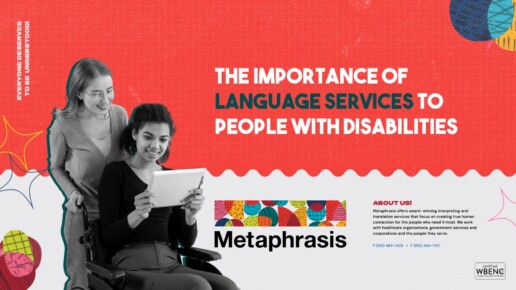The Importance of Language Services to People with Disabilities
In a world that’s becoming increasingly connected and diverse, language should be a bridge, not a barrier. For individuals with disabilities, especially those who are deaf, hard of hearing, blind, or have cognitive impairments, communication can often present a significant challenge. This is where language services step in as game changers. Metaphrasis play a critical role in breaking down communication barriers and ensuring inclusivity for all, regardless of ability or background.
Let’s dive deep into why language services are not just helpful, but absolutely essential for people with disabilities—and how Metaphrasis are transforming lives.
What Are Language Services?
Language services include a wide range of support mechanisms like translation, interpretation (spoken or signed), transcription, captioning, and localization. They can be tailored for spoken languages, sign language, and even adapted for formats accessible to those with visual or cognitive impairments.
For instance:
- Sign language interpretation for deaf individuals.
- Real-time captioning during meetings or lectures.
- Braille transcription for people who are blind.
- Simplified language documents for those with intellectual disabilities.
These services ensure that people with disabilities can access the same information, participate in the same activities, and enjoy the same opportunities as everyone else.
Why Language Access Matters for People with Disabilities
For someone with a disability, especially one that affects communication, the lack of appropriate language services can result in exclusion, misunderstanding, and even danger. Consider a medical appointment where a deaf patient can’t communicate with their doctor because no interpreter is present. Misdiagnoses, incorrect medication instructions, or feelings of neglect can arise from such scenarios.
Language access is not a luxury—it’s a basic human right. It supports independence, equality, and dignity.
Here’s how it specifically impacts different communities:
- Deaf and hard of hearing individuals benefit immensely from sign language interpreters or captioning, especially in healthcare, education, and legal settings.
- Visually impaired people rely on services like audio descriptions, Braille translation, and screen reader-friendly content to access written material and digital content.
- People with cognitive or intellectual disabilities often require plain language services or visual aids to understand complex information.
Legal Obligations and Social Responsibility
In many countries, including the United States, laws mandate language access for people with disabilities. The Americans with Disabilities Act (ADA), for example, requires public entities and organizations receiving federal funds to provide effective communication for individuals with disabilities. This means not just offering services, but ensuring that they are timely, accurate, and culturally appropriate.
But beyond legal compliance, there’s a moral obligation for society and businesses to be inclusive. Language services empower people to advocate for themselves, access essential services, and live with autonomy.
The Role of Metaphrasis in Providing Inclusive Communication
Metaphrasis is more than just a translation company Chicago—it’s a mission-driven organization that deeply understands the need for empathy and accuracy in communication. With a team of professional interpreters, translators, and accessibility experts, they offer tailored language services that meet the needs of people with a variety of disabilities.
What makes Metaphrasis stand out?
- Trained professionals in medical and legal interpreting, including American Sign Language (ASL).
- Cultural competence and sensitivity, ensuring that clients not only understand the words but also the context.
- Customized services for different settings—healthcare, legal, education, corporate, and community services.
By focusing on both quality and compassion, Metaphrasis plays a pivotal role in bridging the communication gap for marginalized populations.
Real-World Impact: Transforming Lives through Language
Let’s paint a real-life picture. Imagine a deaf parent attending a parent-teacher conference. With a certified ASL interpreter from Metaphrasis, they can fully engage in the discussion about their child’s progress, ask questions, and be an active participant in their child’s education.
Or picture a blind person receiving a Braille transcription of a legal document. Now, they can read it on their own terms, without relying on someone else to interpret legal jargon that might affect their future.
These aren’t just services—they’re lifelines that foster independence, trust, and inclusion.
The Future of Language Services and Accessibility
Technology is also changing the landscape of accessibility. Real-time AI captioning, text-to-speech software and remote video interpreting are becoming more widespread. However, technology alone isn’t enough—human insight and understanding are still vital, especially in sensitive settings like healthcare or courtrooms.
As the demand for inclusivity grows, companies like Metaphrasis are leading the way by combining technology with human touch. They’re not just helping people understand—they’re making sure people feel heard, respected, and seen.
Conclusion
Language is the key to connection, and no one should be locked out of communication because of a disability. The work done by organizations like Metaphrasis proves that when we prioritize language access, we unlock opportunities, build more inclusive communities, and affirm the dignity of every individual.
Language services are not optional—they are essential.

